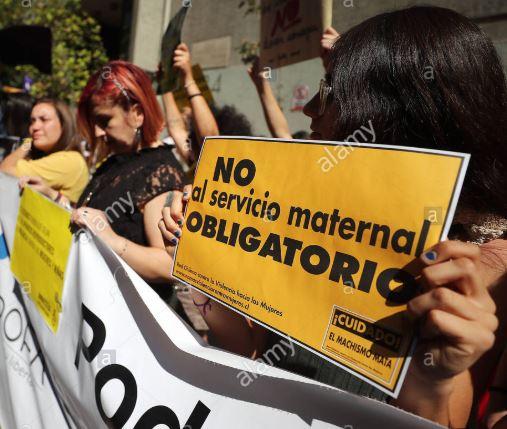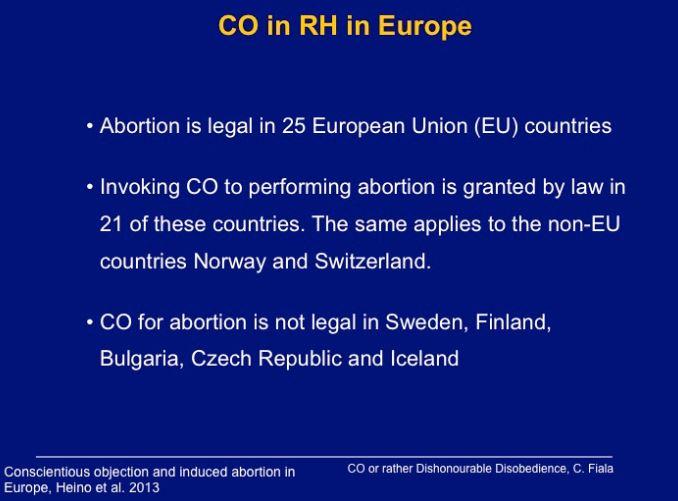Publications: Women’s Stories, Law Reform, Telemedicine, Conscientious Objection, and a 19th Century Trial
12 June 2019
|
|
|
HONDURAS
Feature Story: Life or Death Choices for Women Living Under Abortion Ban
by Amy Braunschweiger, Margaret Wurth

Not one more woman’s death, International Women’s Day, 8 March 2019, Tegucigalpa
Honduras’ total ban on abortion in all circumstances puts women and girls in danger and violates their rights, Human Rights Watch said, releasing a web feature on the topic. This excellent article shares moving stories of Honduran women confronting the cruel effects of the abortion law. They include a woman forced to bear her rapist’s child; a woman facing jail after having a miscarriage; women who experienced complications from clandestine abortions; a pro-choice pastor who has faced death threats for her activism; a doctor who cannot always act in her patients’ best interests; and women who share information about safe abortion in secret through an anonymous phone line.
Public health data suggests that at least 40% of pregnancies are unplanned or unwanted at the time they occur. The full ban on abortion makes it impossible to know how many women and girls have abortions in Honduras. One Honduran NGO estimated that 50,000 to 80,000 abortions occur each year. Women said they tried to end unwanted pregnancies using medication, but access to misoprostol is difficult and can be expensive. Many others use clandestine clinics. Data from the Honduras Health Secretary show that more than 8,600 women were hospitalised for complications from abortion or miscarriage in 2017.
SOURCE: Somos Muchas, Honduras, E-mail 10 June 2019, shared: Human Rights Watch, 6 June 2019 + PHOTO: © 2019 Orlando Sierra/AFP/Getty Images ; + en Español
FULL REPORT
|
|
|
IRELAND
#RepealedThe8th: Translating Travesty, Global Conversation, and the Irish Abortion Referendum
by Ruth Fletcher

Feminist Legal Studies November 2018;26(3):233-59
Abstract
Why does #RepealedThe8th matter for feminist legal studies? The answers seem obvious in one sense. Feminism has long constituted itself through the struggle for sexual and reproductive justice, and Irish feminism has contributed a significant ‘legal win’ with the landslide vote of approval for lifting abortion restrictions in the referendum on the 25th May 2018. That win comes at a global moment when populist legal engagement is doing significant damage in countries that regard themselves as world leaders, and beyond. Repeal shows how legal tools like the vote may be made into an expression of care for reproductive lives. This expression is important in recognizing pregnant people as knowing agents who are best placed to decide, and in seeking to do justice to those who contribute to everyday reproductive life... I begin by reflecting on repeal as a process of feminist socio-legal translation, which shows us how legal change comes about through the motivation of collective joy, the mourning of damaged and lost lives, the sharing of legal knowledge, and the claiming of the rest of reproductive life.
VISUAL: Together for Yes co-directors: Orla O’Connor, National Women’s Council of Ireland; Ailbhe Smyth, Coalition to Repeal the 8th; Grainne Griffin, Abortion Rights Campaign. Photo: Chris Bellew/Fennell Photography in: Irish Examiner, 3 June 2019
FULL REPORT
|
|
|
ITALY
VIDEO: Aborto: libere di scegliere, togliamoci la maschera
(Abortion: free to choose, let's take off the mask)
by Associazione Luca Coscioni

On 22 May 2019, the 41st anniversary of the Law 194 was celebrated. It ends the 40 years since the law was passed, which has been strongly disregarded, in spite of the popular will. Statistics indicate that 68% of gynaecologists claim conscientious objection. This is leading in some regions (like Molise) to women being unable to have an abortion. A survey conducted by the Luca Coscioni Association for the Freedom of Scientific Research through SWG reveals that as many as 31% of the population - a sharp increase compared to 19% in 2016 - believes that the law should be changed to protect access to abortion; 50% of respondents also asked to improve access to abortion pills, used on an outpatient basis or at home as in many other parts of the world, and 27% call for free contraception. These views are in contrast with the political inertia on the subject.
This video appeals to politicians. Filomena Gallo says: "A mask against hatred and for women's freedom of choice". The proposed “Regional Law on Safe Abortion" starts from the region of Lombardy and aims to reach the whole country.
Read more and sign the appeal.
VIDEO, 22 May 2019 with subtitles in Arabic, Italian, Spanish, Romanian
FULL REPORT
|
|
|
SYSTEMATIC REVIEW
Telemedicine for medical abortion: a systematic review
by M Endler, A Lavelanet, A Cleeve, B Ganatra, R Gomperts, K Gemzell-Danielsson

BJOG: An International Journal of Obstetrics & Gynaecology 14 March 2019 (Open access)
DOI: 10.1111/1471-0528.15684
Abstract
Objective: To assess the success rate, safety, and acceptability for women and providers of medical abortion using telemedicine.
Study criteria: We selected studies where telemedicine was used for comprehensive medical abortion services, i.e. assessment/counselling, treatment, and follow up, reporting on success rate (continuing pregnancy, complete abortion, and surgical evacuation), safety (rate of blood transfusion and hospitalisation) or acceptability (satisfaction, dissatisfaction, and recommendation of the service).
Conclusion: Medical abortion through telemedicine seems to be highly acceptable to women. Rates of continuing pregnancy, complete abortion, haemorrhage and hospitalisation are similar to those reported in the literature for in‐person abortion care. Surgical evacuation rates are higher. The compiled results in this review are based mostly on self‐reported data and come with several methodological limitations. To inform future policy recommendations, abortion care through telemedicine needs to be defined and research is needed on the feasibility of using TM for abortion in low‐resource settings.
LINKED ARTICLE
Commentary on this article by Daniel Grossman, ANSIRH, University of California at San Francisco, USA. 10 May 2019 at: https://doi.org/10.1111/1471-0528.15802
FULL REPORT
|
|
|
CONSCIENTIOUS OBJECTION 1: ARGENTINA
Re-thinking the use of conscientious objection by health professionals: A regulatory proposal based on legal abortion practices in Argentina
by Sonia Ariza Navarrete, Agustina Ramón Michel

My body doesn’t need your opinion
Center for Studies of State and Society (CEDES, Argentina) and Ipas
Based on legal abortion practices in Argentina, this paper proposes language for the regulation of conscientious objection within public policy. This proposal is empirically informed, based on a review of comparative legal studies and a conceptual framework that considers regulatory needs, gaps in public policy and the everyday experiences of women, healthcare teams and health authorities.
While it focuses on the context of Argentina, it will be of interest and use in other countries confronted with the need to address providers’ refusal to provide abortion services on religious or moral grounds.
Executive Summary in English
Full text in Spanish: Una vuelta de tuerca a la objeción de conciencia, 50 pages
PHOTO by Juan Carlos Ulate/Reuters in: The Conversation, 11 April 2017
FULL REPORT
|
|
|
CONSCIENTIOUS OBJECTION 2: CHILE
The misrepresentation of conscientious objection as a new strategy of resistance to abortion decriminalisation
by Verónica Undurraga, Michelle Sadler

Sexual and Reproductive Health Matters, 14 May 2019 (Open access)
DOI: 10.1080/26410397.2019.1610280
In Chilean history, abortion for therapeutic reasons was allowed until 1989, when a complete ban on abortion was established at the end of the military regime. It was not until August 2017, 23 years after the return of democracy, that Congress decriminalised abortion on three grounds: risk to the life of the pregnant woman, rape, and cases where the fetus is non-viable. The law opened a strong debate about the scope and eligibility for the right to conscientious objection, not only for an individual, but also on an institutional basis. When initially approved by Congress, the bill only included the right to individual conscientious objection for the surgeon who would perform the abortion and the rest of the professional staff present in the surgical ward during the intervention. It prohibited institutional conscientious objection: “Conscientious objection is of a personal nature and in no case may it be invoked by an institution”. However, before publication of the law in 2017, the terms were modified by the Constitutional Court to recognise institutional conscientious objection. The right to object was also extended to non-professional health personnel working in the surgical ward. Moreover, the Constitutional Court eliminated, without explanation, the rule that prevented the objector from excusing himself or herself in cases of imminent expiration of the established deadline in the event of rape, and only maintained the exception in the event that the woman's life was at risk and requiring imminent and unpostponable care.
… The implementation of abortion laws around the world is suffering setbacks due to these ways of interpreting the work of health professionals. What happens in Chile is likely to influence sexual and reproductive health policies in the rest of Latin America. Although the arguments we criticise in this paper may seem unsound, we should not underestimate their impact…
PHOTO: Demonstration against decision to allow institutional conscientious objection, 28 March 2018, Santiago
FULL REPORT
|
|
|
CONSCIENTIOUS OBJECTION 3: UK
Let’s talk about conscientious objection
by Sarah Elizabeth Gull

British Medical Journal Sexual & Reproductive Health, 31 May 2019 (NOT open access)
DOI: http://dx.doi.org/10.1136/bmjsrh-2019-200361
Some years ago I had a registrar who was and remains a devout Buddhist. He was shocked when he attended my gynaecology operating list: “Abortion is a sin!” he exclaimed. Sometime later he revised his thoughts: “Abortion is a sin, but I don’t see why you should have all the sin. I will share this sin with you”. He had, in his own way, changed his mind.
Conscientious objection (CO) remains an important issue in clinical practice, particularly in relation to the provision of abortion. In England, Scotland and Wales, the Abortion Act 19671 states that: "no person shall be under any duty, whether by contract or by any statutory or other legal requirement, to participate in any treatment authorised by this Act to which he has a conscientious objection". The Royal College of Obstetricians and Gynaecologists (RCOG) has issued guidance for trainees for further clarification, which emphasises that doctors may opt out of witnessing and performing abortion, but that they must not withhold clinical advice to patients or impose their views on others.
INFOGRAPHIC, 2013
FULL REPORT
|
|
|
CANADA
The abortion trial of Dr Emily Stowe in 1879

Dr Emily Stowe
The abortion trial of Emily Stowe was a famous early Canadian judicial decision on abortion in Canada. The case involved Dr Emily Stowe, one of Canada's first female doctors. Stowe was acquitted, which was a rare outcome for abortion trials in the 19th century.
The case began after one Sarah Ann Lovell, an unmarried teenager, was found dead in August 1879. It was discovered after she had died that she had been pregnant. Dr Stowe claimed she had first resisted performing an abortion, but Lovell seemed emotionally distressed and threatened suicide. As this was before the quickening, an abortion at this stage would be seen by some as more legitimate. Stowe wound up prescribing hellebore, cantharides, and myrrh. While allegedly capable of aborting the fetus, Stowe claimed these drugs were prescribed in such a small dose that they were intended as a placebo. Furthermore, drugs prescribed in May would not cause death in August.
While it is unlikely that Stowe was pro-choice, this view of her was pushed by those who saw her as responsible for Lovell's death. The case soon achieved fame. A jury for the coroner wound up deciding Lovell was poisoned by drugs meant for an abortion, but they blamed Lovell and/or unidentified people rather than Stowe. The Crown indicted Stowe for having "administered and caused to be taken poisons with intent to procure a miscarriage" which had been outlawed since 1869. Stowe could have gone to prison for life for this. The intent was to discourage abortion in a widely publicized trial. Stowe pleaded not guilty in an Ontario County Court.
SOURCE: Wikipedia, last edited 31 October 2018 ; PHOTO, Courtesy of Wilfrid Laurier University Archives
SEE ALSO: Constance B Backhouse, Canadian Bulletin of Medical History 1991;8:159-87.
FULL REPORT
|
|
|
|